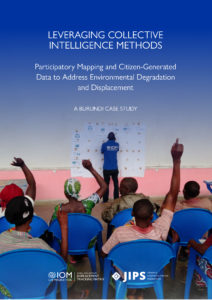
Facing increasing challenges from environmental degradation, IOM and JIPS implemented an innovative project in Burundi in 2022-2024 to leverage the power of Collective Intelligence (CI) to address climate-induced displacement. Over the course of two years, more than 3,300 community members, including displaced persons and local residents, were involved in data collection across four provinces, using citizen-generated data and participatory mapping. These tools identified both the scale of damage caused by natural hazards like floods, landslides, and erosion, as well as local prevention and mitigation measures such as reforestation and improved drainage systems.
The approach engaged non-traditional data collectors, empowering local community members to gather insights and shape their own solutions. Through community consultations, validation sessions, and a tiered data collection process, the project provided a unique opportunity to ensure that vulnerable populations, particularly women and underrepresented groups, had a direct voice in shaping the humanitarian response. By integrating local knowledge and feedback, the project not only helped enhance disaster preparedness but also fostered long-term community ownership.
Discover how this collective effort is redefining resilience and preparedness in Burundi and explore its potential as a model for other climate-affected regions worldwide.